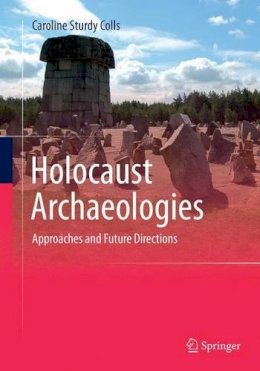
Stock image for illustration purposes only - book cover, edition or condition may vary.
Holocaust Archaeologies: Approaches and Future Directions
Caroline Sturdy Colls
€ 84.83
FREE Delivery in Ireland
Description for Holocaust Archaeologies: Approaches and Future Directions
Paperback. Num Pages: 375 pages, 18 black & white illustrations, 130 colour illustrations, 2 black & white tables, biograp. BIC Classification: HB; HD. Category: (P) Professional & Vocational. Dimension: 254 x 178 x 20. Weight in Grams: 714.
Holocaust Archaeologies: Approaches and Future Directions aims to move archaeological research concerning the Holocaust forward through a discussion of the variety of the political, social, ethical and religious issues that surround investigations of this period and by considering how to address them. It considers the various reasons why archaeological investigations may take place and what issues will be brought to bear when fieldwork is suggested. It presents an interdisciplinary methodology in order to demonstrate how archaeology can (uniquely) contribute to the history of this period. Case examples are used throughout the book in order to contextualise prevalent themes and a ... Read more
Show LessProduct Details
Format
Paperback
Publication date
2016
Publisher
Springer International Publishing AG Switzerland
Number of pages
375
Condition
New
Number of Pages
358
Place of Publication
Cham, Switzerland
ISBN
9783319344959
SKU
V9783319344959
Shipping Time
Usually ships in 15 to 20 working days
Ref
99-15
About Caroline Sturdy Colls
Dr Caroline Sturdy Colls is an Associate Professor at Staffordshire University specialising in forensic and Holocaust archaeology. She is also the Research Lead and founder of the Centre of Archaeology at the same institution. Her research focuses on the application of interdisciplinary approaches to the investigation of Holocaust landscapes. As part of this research, she completed the first archaeological surveys ... Read more
Reviews for Holocaust Archaeologies: Approaches and Future Directions
“Sturdy Colls’ crucial and ambitious volume has provided the foundation for a desperately needed practical and ethical protocol for archaeological investigation of Holocaust sites–one that will aid students and archaeologists considering entering the field, allow educators to keep their courses timely and relevant, inform interested laypeople, and spur debate about the future of Holocaust archaeology.” (Robert M. Ehrenreich, Holocaust and ... Read more
.png)